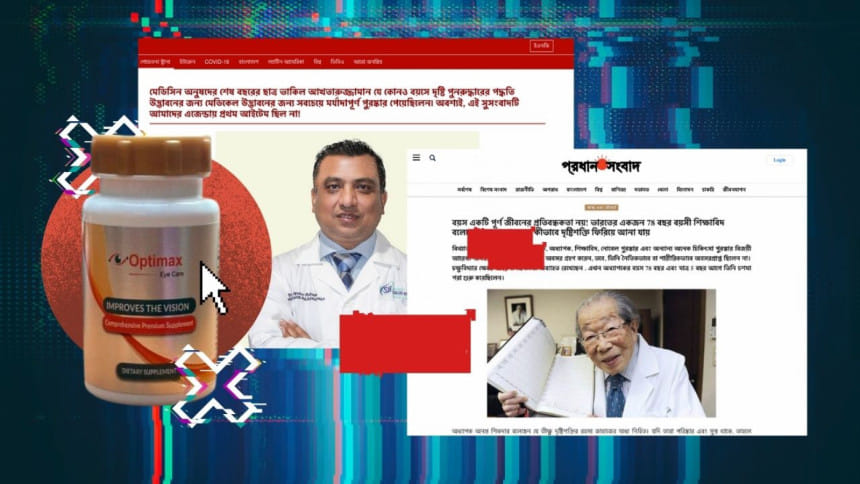Fake product, fake ads, fake newspapers: The Optimax scam

A recent investigation by Dismislab has unveiled a global scam involving the fraudulent promotion of various health products, including a product named Optimax in Bangladesh. This elaborate campaign has been discovered in at least 15 countries across Europe and Asia, and it involves sophisticated techniques to deceive consumers into purchasing unverified health products.
The mechanics of the scam
The fraudulent operation begins with advertisements strategically placed on social media platforms, promoting supposed miracle drugs or health products. These ads lead users to websites that mimic reputable media outlets, featuring fabricated interviews with experts extolling the virtues of these products. The experts' credentials are entirely fabricated, and the websites are meticulously designed to appear legitimate.
In Bangladesh, the product Optimax was promoted through counterfeit pages mimicking the daily Prothom Alo, featuring fake interviews with "prominent" Bangladeshi professionals. The ads claimed Optimax could cure severe eye problems within a short period, a claim with no scientific backing.
Techniques of deception
The campaign involves several deceitful practices, including the creation of counterfeit media pages that mimic established news portals to lend credibility to the fraudulent claims. These fake media pages are designed to look authentic, tricking consumers into believing the information presented is trustworthy. Additionally, the identities and credentials of doctors and scientists are fabricated to endorse the products, giving the illusion of expert validation. Misleading advertisements featuring these fake endorsements are then disseminated widely on social media, further spreading the false narratives and attracting more unsuspecting consumers.
In Bangladesh, microbiologist Dr. Senjuti Saha exposed the fraudulent use of her name and image in the campaign, leading to police involvement. The ads claimed Dr. Saha had developed Optimax, which could restore vision at any age in two weeks. Several counterfeit websites were used to promote this narrative.
Dismislab's investigation revealed that the domains used in the campaign often mimic well-known media sites, including the BBC and Prothom Alo. These domains are used to sell various health products, each with identical promotional tactics. For example, one domain, healthymedproduct.pro, mimicked the design of the BBC website and used the title "BBC News" to appear credible on Google searches. Another domain combined the Prothom Alo logo with a fictional title "Prodhan Sangbad," giving the appearance of a legitimate news portal, though no such portal existed.
In Bangladesh, the primary domain promoting Optimax was wowtop.shop. Under this domain, Dismislab found two separate websites marketing supposed diabetes cures in the Philippines and the UAE, named Diabetin and Diabextan, respectively. Both featured fake interviews with a Japanese doctor on a fictitious media site called Medinews.
Global reach and variety of products
The scam is not isolated to Bangladesh. Evidence of similar campaigns has been found in countries including Italy, Poland, Serbia, the Philippines, and the United Arab Emirates. The products marketed vary by region but include supplements for vision improvement, diabetes management, and joint pain relief. None of these products are recognised medical drugs, and some are merely dietary supplements.
The campaign originated in Russia in 2020 and has since spread across Eastern Europe and Asia. A 2023 report by SEE Check, a network of six fact-checking organisations in Southeastern Europe, detailed fake advertisements for a product called O-Caps, purported to enhance vision. Despite exposure, the campaign continues to proliferate.
Authorities in some countries have issued warnings against the use of these products.

 For all latest news, follow The Daily Star's Google News channel.
For all latest news, follow The Daily Star's Google News channel. 



Comments